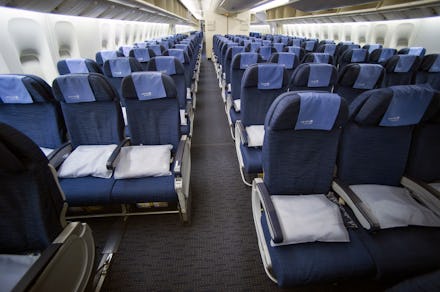The 'New York Times' guide to protection from assault on a plane is a victim-blaming mess

When Jessica Leeds came forward with accusations that Republican presidential nominee Donald Trump sexually assaulted her on an airplane, the first thing many people did was doubt her. Trump campaign spokeswoman Katrina Pierson argued on CNN that planes in the 1980s had fixed armrests in their first class cabins, meaning Trump couldn't have lifted the armrest to grope Leeds, as she alleged. Others claimed Leeds was seeking media attention or lying for Hillary Clinton's benefit.
The New York Times, the outlet Leeds trusted to share her story, didn't necessarily cast doubt on Leeds' allegations when they ran an article headlined "How to Protect Yourself From Sexual Assault on a Plane" on Friday.
But it didn't exactly help, either.
In the travel piece, the Times offers readers expert advice to "help minimize the risk of being sexually assaulted on an aircraft," including tips like "stay alert," "be assertive" and "speak up." While these pointers might seem harmless enough, they ultimately suggest it is the victim's responsibility to prevent unwanted advances — and therefore the victim's fault if she fails to do so.
The Times piece warns against drinking or taking sleeping pills or other drugs — aids many people often need to cope with motion sickness, anxiety or a severe phobia. Elizabeth L. Jeglic, a professor of psychology at John Jay College of Criminal Justice, told the Times perpetrators will often "inebriate their victims" in order to incapacitate them. Of course, Jeglic's groundbreaking revelation only adds fuel to the victim-blaming fire: If you were groped after an in-flight cocktail, you were asking for it.
Jeglic goes on to advise readers to rebuff someone firmly if they're "encroaching on your space" — because just saying "no" has always been a tried and true way of stopping a sexual abuser, right?
Allison Dvaladze, who was once sexually assaulted on a flight to Amsterdam, suggested planning even further in advance. She recommended booking an aisle seat, likely so you can either get the attention of a flight attendant or make a quick escape if you're being attacked.
Let's be clear: That women have to think about sexual assault at every turn is the peak of patriarchal BS. When flying, women have the right to sip a gin and tonic and read a trashy magazine without fear of being groped, just like everyone else. Instead, they are tasked with constantly thinking about their bodily safety and, if it's violated, they're blamed for letting their guard down.
Though the Times piece may be well-intentioned, it aligns itself with those who believe sexual assault is the result of women's failure to be vigilant enough, cautious enough, modest enough — take your pick.
Jordan Cohen, the Times' senior manager of communications, provided the following statement to Mic via email:
Sexual assault is a serious issue that affects the lives of our readers and one that the Times covers regularly. This article, a companion piece to a report on the new focus that has been put on sexual assault on airplanes, acknowledges that sexual misconduct on airplanes is a real issue and offers advice from survivors and experts on how to prevent, address and combat assaults on a plane. The Travel section regularly runs similar service pieces with tips meant to empower travelers through difficult situations.
Still, what makes sexual assault such a widespread epidemic, isn't women's lack of knowledge about how to "prevent" it — it's perpetrators' unwillingness to stop it.